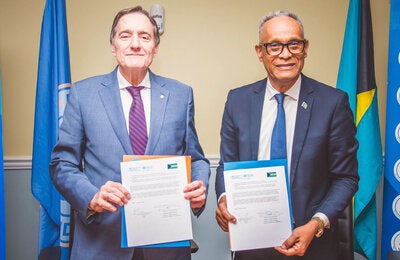

Experts from the World Health Organization (WHO), nongovernmental organizations and academia are developing new recommendations for how to educate and train the health workforce to better respond to changing health needs.
Experts from the World Health Organization (WHO), nongovernmental organizations and academia are developing new recommendations for how to educate and train the health workforce to better respond to changing health needs.

The experts are gathering this week (March 20-22) at the Pan American Health Organization (PAHO), Regional Office for the Americas of WHO, for a meeting organized by PAHO/WHO with support from Capacity Plus (a global project of the U.S. Agency for International Development, USAID) and in collaboration with the U.S. President's Emergency Fund for AIDS Relief (PEPFAR) and USAID.
The need for renewed efforts in this area arises from a global crisis in the health workforce, which is characterized by critical shortages, mismatched skills, and uneven geographical distribution of health professionals, problems that leave millions of people without access to appropriate health services.
The recommendations are intended to provide guidance to policymakers and educators on how to increase the number of health workers with the right skills. They will include guidance on attracting a broad range of health workers professionals and enrolling them into appropriate training programs, and how to adapt to technological changes and the challenges on faculty and curriculum development to deliver quality education and training.
"The challenges are not limited to increasing the output of health professionals by training institutions, which is obviously indispensable to address situations of absolute shortages," said Dr. Jon K. Andrus, PAHO's Deputy Director, in opening the meeting. "The question is more complex and requires higher levels of political commitment, innovations and creativity, as reflected in the very questions that this initiative is addressing."
Despite progress in medical education in Latin America and the Caribbean, millions of the Region's people lack regular access to basic care. "The poorest, the least empowered, the most marginalized are generally those who have the least access to health care services, with the fewest numbers of qualified health professionals," said Dr. Andrus.
He added that higher-income countries also face challenges in maintaining a sufficient health workforce, particularly in the area of primary health care.
Since the 1960s, the Region of the Americas has seen a steady expansion in the number of academic and training institutions for health personnel, and PAHO has been closely associated with this trend, Dr. Andrus noted. As an example, he cited PALTEX, a PAHO program that facilitates access for health sciences students to textbooks and educational material in 530 academic centers in more than 20 countries.
Other participants in this week's meeting include Wim Van Lergerghe, Director of Policy in WHO's Health Systems and Human Resources department, who emphasized the importance of adapting the education of health professionals to the process of health system reform. Dr. Estelle Quain, of USAID, said the new recommendations must address how to keep health professionals in their profession while also focusing on how to better meet the workforce needs of emerging health systems.
Links:



